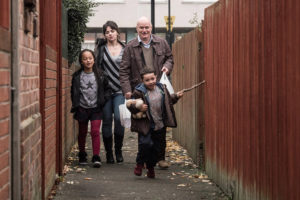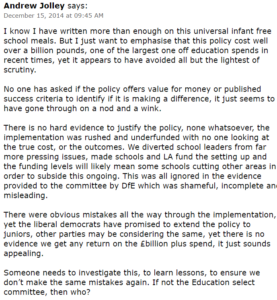Should I quit education?
9th November 2016
It’s been a disturbing few months. Brexit, last weeks’ constitutional turmoil and now the horrors of Trump. Many of us have been left wondering where exactly our world is going.
Fiddling whilst Rome burns?
Signing online petitions and liking TED talks long ago stopped feeling like an adequate response, but one might have hoped that at least those of us working in the education system could console ourselves with the knowledge that we are working to build a better future. However, as the gravity of our predicament deepens, I have to admit to the occasional moment of doubt. Are we simply fiddling whilst Rome burns?
Like many, confronted with the gradual disintegration of much that they hold dear, I’ve come to realise, not only that it might it not be the case that “things can only get better” – things might actually get a whole lot worse.
As this realisation dawns, I’ve had to ask myself “am I doing enough to fight for what I believe in?”and “where does education fit into the dystopian situation we currently find ourselves in?”
 Education, poverty and unity
Education, poverty and unity
My rejection of the idealistic belief that education on its own can solve everything has been a gradual one but it climaxed in a minor existential crisis when I went to see “I, Daniel Blake” on Sunday. As the end credits rolled, my mum and I stayed seated, bawling our eyes out as the cinema staff cleared up the detritus of £6 glasses of wine from around us. For those of you who have not seen the film, go and see it. In brief, it follows the fortunes, (or rather, misfortunes) of Daniel, who gets trapped in a series of battles with an inhuman benefits system following a heart of attack. Trapped alongside him is Katie and her two children who have been re-homed in Newcastle after two years in a homeless shelter. The bleakness is at times overwhelming but the film is superb.
As we pointed out in our report last week, “poverty consistently undermines cohesion” and so long as the sort of poverty faced by Katie and Daniel persists, how can we possibly believe that arguing about academisation and Ofsted frameworks will change anything? Is it maybe time to quit education and focus on something else?
Galvanised
No. All things considered, I am not about to quit education. In fact, the more I have focused on Daisy and Dylan (Katie’s children in Loach’s film) the more my passion for the sector has been galvanised. Now, more than ever, I am convinced of the crucial need to support young people’s transition to adulthood.
 Loach portrays Katie’s two children beautifully. They continuously reminded me of pupils I’ve taught: Daisy is bookish and sweet. She is old enough to understand what’s going on around her and to realise that Katie can’t afford to replace her shoes, even though they’re falling apart after a failed attempt to glue them together. Dylan meanwhile hasn’t coped well with the last two years. Sharing a single room in a hostel between the three of them has clearly taken its toll as he obsessively bounces his ball on the stairs “especially when he’s angry” and struggles to concentrate for more than a few minutes.
Loach portrays Katie’s two children beautifully. They continuously reminded me of pupils I’ve taught: Daisy is bookish and sweet. She is old enough to understand what’s going on around her and to realise that Katie can’t afford to replace her shoes, even though they’re falling apart after a failed attempt to glue them together. Dylan meanwhile hasn’t coped well with the last two years. Sharing a single room in a hostel between the three of them has clearly taken its toll as he obsessively bounces his ball on the stairs “especially when he’s angry” and struggles to concentrate for more than a few minutes.
Big changes are needed if children like Daisy and Dylan are to achieve a decent standard of living and if their life-chances are to be anywhere near acceptable. They need a minimum reliable income – so Katie doesn’t get pushed into prostitution as she eventually does, and secure housing – so that they are not kicked out when they complain to their landlord about living conditions (which is why I am increasing my monthly donation to the charity Shelter).
Mitigation and insulation
However, support from schools and youth services still has the potential to insulate children like Dylan and Daisy from some of the damage being done, and of giving them a future that is just that bit brighter.
Take a few examples:
- Our report on social cohesion, pointed out that when pupils feel unsafe or at risk of bullying, segregation and division ensues. We argued that building cohesion isn’t so much about changing the curriculum, it’s about creating the right environment – an environment in which Daisy being teased by classmates for having disintegrating shoes doesn’t go unchallenged. Every teacher and school leader has it within their power to counter this sort of damage. As Ali Michael points out in this wonderful piece:
“Tell them bigotry is not a democratic value, and that it will not be tolerated at your school. Tell them you stand by your Muslim families. Your same-sex parent families. Your gay students. Your Black families. Your female students. Your Mexican families. Your disabled students. Your immigrant families. Your trans students. Your Native students. Tell them you won’t let anyone hurt them or deport them or threaten them without having to contend with you first”
 Last week, the EEF published new research showing breakfast clubs’ potential impact on disadvantaged students. If only the government had spent the fortune it spent on universal infant free school meals on breakfast clubs instead. Perhaps if they had done so, Katie wouldn’t have been unable to attend job interviews because of school drop-offs. Perhaps Daisy and Dylan would have got a decent meal before starting the school day. Even in lean times policy makers can make better spending decisions and research evidence can do more to guide them.
Last week, the EEF published new research showing breakfast clubs’ potential impact on disadvantaged students. If only the government had spent the fortune it spent on universal infant free school meals on breakfast clubs instead. Perhaps if they had done so, Katie wouldn’t have been unable to attend job interviews because of school drop-offs. Perhaps Daisy and Dylan would have got a decent meal before starting the school day. Even in lean times policy makers can make better spending decisions and research evidence can do more to guide them.
Exactly what @ajjolley has argued for years now. Breakfast clubs a better use of funds than UIFSM https://t.co/Rj82oFNP8c
— Rachel Gooch (@SchoolDuggery) November 4, 2016
Over the last year and half we have repeatedly called for more consistent identification of special needs and more funding for educational psychologists and Child and Adolescent Mental Health Services (here, here and here).
Far be it for me to try and diagnose Dylan’s obvious difficulties, but a civilised society would surely ensure children’s mental health is a priority. Policy makers have the power to ensure mental health is not underfunded in comparison to physical health and schools can take the initiative in brokering partnerships with services that could help Dylan with his profound distress (see case study 3, page 34).
Other currently answered questions also spring to mind as I think about the Daisy, Dylan and children like them:
- Might extended hours, in partnership with youth clubs for example, be a way of ensuring they can access sports, trips and other activities that families couldn’t otherwise afford?
- Might nurture groups help them adjust and cope or would they add to segregation (see page 35, and the work of the nurture group network)?
We’ve called for and driven forward research in these areas in the past and I’m determined to keep doing so.
We need to end poverty and stop anyone experiencing the dire circumstances laid bare in the film. However rough times are geeing me into a more impassioned desire to do all I can in the education sector. After all, it is the bit of society I have most knowledge of, and influence over.
Ultimately, if we can ensure all children and young people receive the support they need to make a fulfilling transition to adulthood, we at least have a chance of boosting life chances and mitigating the long-term damage of a tumultuous world.

Thank you for this. I work in education and have had similar thoughts about whether I can do enough, which reached crisis levels after the election news yesterday! This article has really helped me hang on in there and look at what the evidence tells me I can do that will make a difference.
I agree that we need to make a difference to children and their families but the part about “what” to teach in terms of values stretches into indoctrination territory for me. Also can I remind you that the teacher standards includes not teaching according to personal beliefs. Hence the comment about Trump contradicts this. We have these things in place so they are not abused by anyone. Some might feel justified in doing so but that simply encourages a situation where others will too. Justifying double-standards is not the way forward.
Thanks Tarjinder. Which bit though do you think is indoctrination? I’m not saying teachers should teach in favour/against any particular politican… If you mean about standing up for minorities, I simply mean exactly what is in the current teaching standards, ie. “fundamental British values, including democracy, the rule of law, individual liberty and mutual respect, and tolerance of those with different faiths and beliefs”
But the quote used does assume that those who voted for Trump did so because they are racist. I don’t think that is the case. Some did it despite that for very different reasons. I think teaching the statistics would be of far more benefit to understand why. Also regardless of whether one agrees with it or not. All the changes are based on people making choices via the ballot box. Voter turnout was lower among groups such as black voters – why is that the case in this situation? Equally respect for minorities doesn’t translate into minority rule. It also doesn’t mean that certain groups should be elevated regardless. This is what allowed the child abuse scandal to occur in Rotherham and which has conversely fuelled more racist elements. It’s not just respect but what respect is and how it has to be shown by all, including minorities.
I read that comment more as a reassurance to pupils that teachers would do what was in their power to protect their students.
On turnout etc, that’s why our cohesion report and our oracy report have both re-emphasised the need to engage and empower pupils politically.
Great article. To truly benefit the Daisy’s abs Dylan’s of our world,we need teachers and school leaders who are not mentally and physically drained but rather have mastered the art of being a teachers and leaders- only then will they be well enough to challenge for change.
Nicely put, Loic. I think it’s important for all professionals to go through occasional periods of deep self-reflection like this. This is something I try to encourage in my coaching work, as what emerges is a more focused and determined professional. Reflecting on how one’s work aligns with the achievement of one’s personal aims – and indeed whether the things one is being asked (or is able) to do at work are at odds with those personal aims – is vital. In essence, the job of teaching and the work of schools should be relatively simple. But there is now so much else to do, it’s too easy to lose sight of those basic good things. The achievement of better educational outcomes, and the subsequent creation of a better society, depend on regaining that focus, and rejecting – or at least deprioritising – all else. So keep reflecting, but do stay!